Message List
Overview
MessageList is a Composite Component that displays a list of messages and effectively manages real-time operations. It includes various types of messages such as Text Messages, Media Messages, Stickers, and more.
MessageList is primarily a list of the base component MessageBubble. The MessageBubble Component is utilized to create different types of chat bubbles depending on the message type.
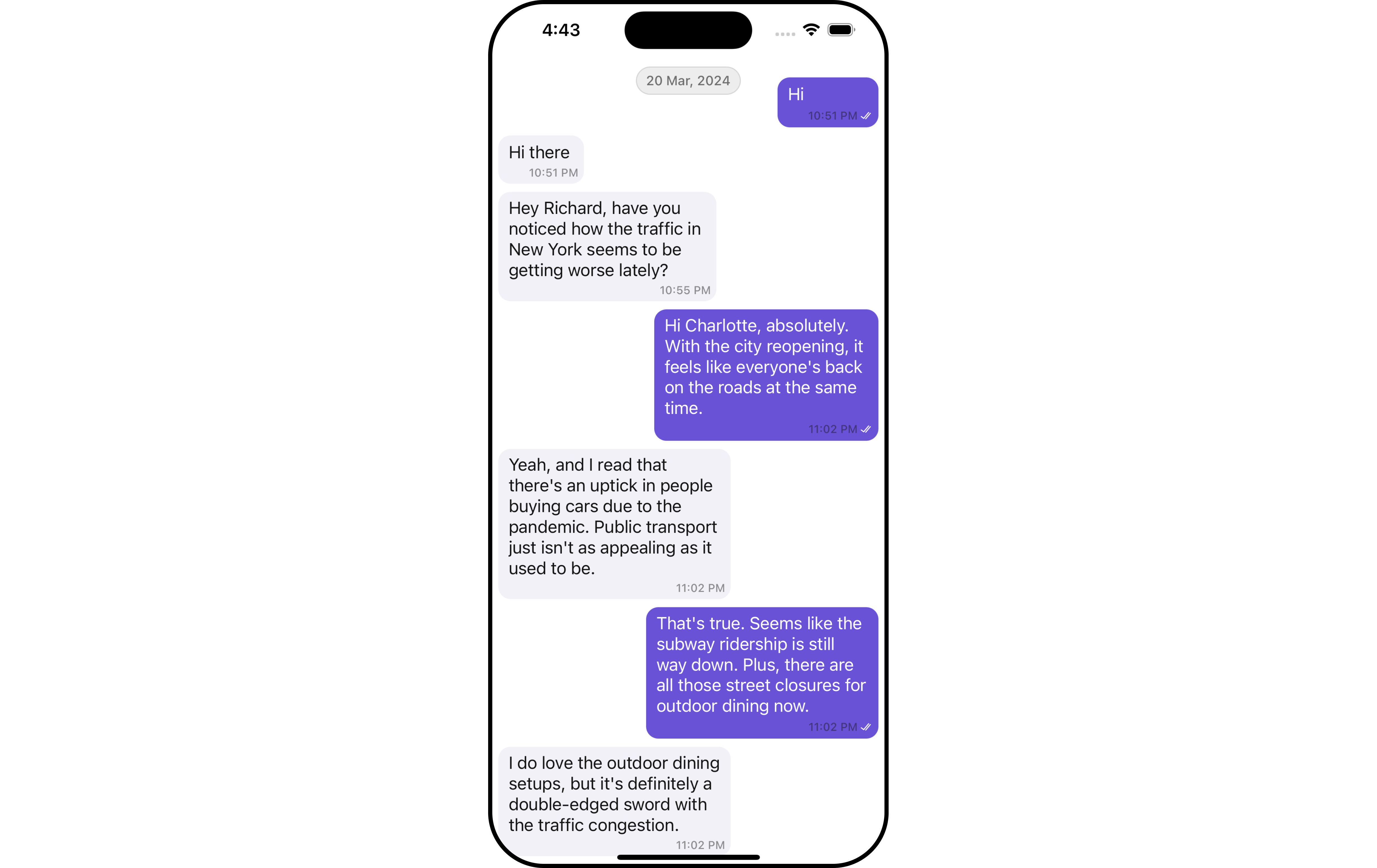
Usage
Integration
The following code snippet illustrates how you can directly incorporate the MessageList component.
- Swift
// syntax for set(user: User)
messageList.set(user: user)
// syntax for set(user: User, parentMessage: BaseMessage? = nil)
messageList.set(user: user, parentMessage: textMessage)
To retrieve messages for a specific entity, you must associate it with either a User or Group object.
Actions
Actions dictate how a component functions. They are divided into two types: Predefined and User-defined. You can override either type, allowing you to tailor the behavior of the component to fit your specific needs.
1. onThreadRepliesClick
onThreadRepliesClick is triggered when you click on the threaded message bubble.
The onThreadRepliesClick action doesn't have a predefined behavior. You can override this action using the following code snippet.
- Swift
let messageListConfiguration = MessageListConfiguration()
.setOnThreadRepliesClick { message, messageBubbleView in
// Your action onclick
}
2. onError
You can customize this behavior by using the provided code snippet to override the error view and improve error handling. You have the option to integrate your own custom UIView file for this purpose.
- Swift
let messageListConfiguration = MessageListConfiguration()
.set(errorStateView: UIView)
Filters
You can adjust the MessagesRequestBuilder in the MessageList Component to customize your message list. Numerous options are available to alter the builder to meet your specific needs. For additional details on MessagesRequestBuilder, please visit MessagesRequestBuilder.

In the example below, we are applying a filter to the messages based on a search substring and for a specific user. This means that only messages that contain the search term and are associated with the specified user will be displayed
- Swift
let messageRequestBuilder = MessagesRequest.MessageRequestBuilder()
.set(uid: "YOUR_UID")
.set(types: ["Text"])
.set(searchKeyword: "sure")
let messageListConfiguration = MessageListConfiguration()
.set(messagesRequestBuilder:messageRequestBuilder)
let cometChatMessages = CometChatMessages()
.set(user: user)
.set(messageListConfiguration: messageListConfiguration)
The following parameters in messageRequestBuilder will always be altered inside the message list
- UID
- GUID
- types
- categories
Ensure to include the uid and name of the User in the implementation.
Events
Events are emitted by a Component. By using event you can extend existing functionality. Being global events, they can be applied in Multiple Locations and are capable of being Added or Removed.
The MessageList Component does not emit any events of its own.
Customization
To fit your app's design requirements, you can customize the appearance of the conversation component. We provide exposed methods that allow you to modify the experience and behavior according to your specific needs.
Style
Using Style you can customize the look and feel of the component in your app, These parameters typically control elements such as the color, size, shape, and fonts used within the component.
1. MessageList Style
You can set the MessageListStyle to the MessageList Component to customize the styling.
- Swift
let messageListStyle = MessageListStyle()
.set(background: .systemMint)
.set(borderColor: .green)
.set(borderWidth: 30)
.set(cornerRadius: cometChatCornerStyle)
List of properties exposed by MessageListStyle
| Property | Description | Code |
|---|---|---|
| Border Width | used to set border width | .set(borderWidth: CGFloat) |
| Border Color | used to set border color | .set(titleColor: UIColor) |
| Corner Radius | used to set corner radius | .set(cornerRadius: CometChatCornerStyle) |
| LoadingIcon Tint | used to set loading icon tint | .set(loadingIconTint: UIColor) |
| EmptyText Appearance | used to set empty state text Appearance | .set(emptyTextFont: UIFont) |
| ErrorText Appearance | used to set error text Appearance | .set(errorTextFont: UIFont) |
| EmptyText Color | used to set empty state text color | .set(emptyTextColor: UIColor) |
| ErrorText Color | used to set error state text color | .set(errorTextColor: UIColor) |
| NameText Color | used to set sender/receiver name text color on a message bubble. | .set(nameTextColor: UIColor) |
| NameText Appearance | used to set sender/receiver name text appearance on a message bubble | .set(nameTextFont: UIFont) |
| TimeStampText Color | used to set time stamp text appearance | .set(timestampTextColor: UIColor) |
| ThreadReplySeparator Color | used to set thread reply separator color | .set(threadReplySeperatorColor: UIColor) |
| ThreadReplyText Color | used to set thread reply text color | .set(threadReplyTextColor: UIColor) |
| ThreadReplyText Appearance | used to set thread reply text appearance | .set(threadReplyTextFont: UIFont) |
| Background | This method will set the background color for message list | .set(background: UIColor) |
2. Avatar Style
To apply customized styles to the Avatar component in the Conversations Component, you can use the following code snippet. For further insights on Avatar Styles refer
- Swift
let avatarStyle = AvatarStyle()
.set(background: .blue)
.set(borderColor: .gray)
let messageListStyle = MessageListStyle()
.set(background: .systemMint)
let messageListConfiguration = MessageListConfiguration()
.set(messageListStyle: messageListStyle)
.show(avatar: true)
Functionality
These are a set of small functional customizations that allow you to fine-tune the overall experience of the component. With these, you can change text, set custom icons, and toggle the visibility of UI elements.
- Swift
let messageList = CometChatMessageList()
.set(user: user)
.hide(error: false)
.disable(receipt: false)
Below is a list of customizations along with corresponding code snippets
Advance
For advanced-level customization, you can set custom views to the component. This lets you tailor each aspect of the component to fit your exact needs and application aesthetics. You can create and define your views, layouts, and UI elements and then incorporate those into the component.
Set Template
CometChatMessageTemplate is a pre-defined structure for creating message views that can be used as a starting point or blueprint for creating message views often known as message bubbles. For more information, you can refer to CometChatMessageTemplate.
You can set message Templates to MessageList by using the following code snippet
- Swift
let textTemp1: CometChatMessageTemplate = CometChatUIKit.getDataSource().getTextMessageTemplate()
let imageTemp: CometChatMessageTemplate = CometChatUIKit.getDataSource().getImageMessageTemplate()
let textTemp: [CometChatMessageTemplate] = [textTemp1, imageTemp]
let messageListStyle = MessageListStyle()
.set(background: .systemTeal)
let messageListConfiguration = MessageListConfiguration()
.set(messageListStyle: messageListStyle)
.show(avatar: true)
set(templates: textTemp)
Set HeaderView
You can set custom headerView to the Message List component using the following method.
let headerView = CustomHeaderView(user: user)
messageList.set(headerView: headerView)
Example
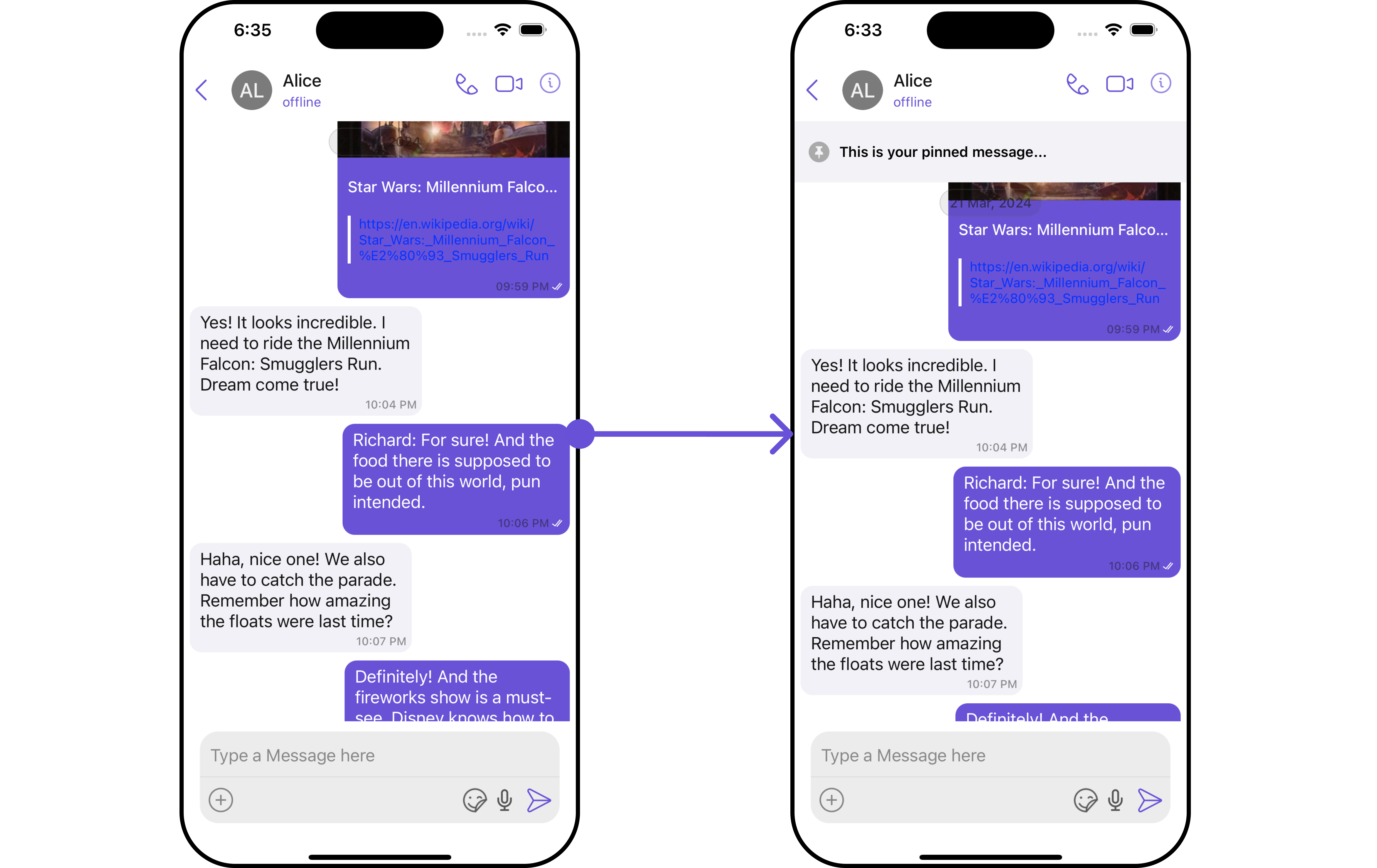
- Swift
let customHeaderView = CustomChatListHeaderView() // CustomChatListHeaderView() is of type UIView()
let messageListConfiguration = MessageListConfiguration()
messageListConfiguration.set(headerView: customHeaderView)
Following is the code of CustomChatListHeaderView UIView Class
class CustomChatListHeaderView: UIView {
private let pinImageView: UIImageView = {
let imageView = UIImageView()
imageView.image = UIImage(systemName: "pin.circle.fill") // set your image here
imageView.contentMode = .scaleAspectFit
imageView.translatesAutoresizingMaskIntoConstraints = false
imageView.tintColor = .lightGray
return imageView
}()
private let titleLabel: UILabel = {
let label = UILabel()
label.textColor = .black
label.font = UIFont.boldSystemFont(ofSize: 14)
label.text = "This is your pinned message..."
label.translatesAutoresizingMaskIntoConstraints = false
return label
}()
override init(frame: CGRect) {
super.init(frame: frame)
setupView()
}
required init?(coder aDecoder: NSCoder) {
super.init(coder: aDecoder)
setupView()
}
private func setupView() {
backgroundColor = .systemGray6
heightAnchor.constraint(equalToConstant: 50).isActive = true
addSubview(pinImageView)
addSubview(titleLabel)
NSLayoutConstraint.activate([
pinImageView.centerYAnchor.constraint(equalTo: centerYAnchor),
pinImageView.leadingAnchor.constraint(equalTo: leadingAnchor, constant: 16),
pinImageView.widthAnchor.constraint(equalToConstant: 24), // Adjust width as needed
pinImageView.heightAnchor.constraint(equalToConstant: 24), // Adjust height as needed
titleLabel.centerYAnchor.constraint(equalTo: centerYAnchor),
titleLabel.leadingAnchor.constraint(equalTo: pinImageView.trailingAnchor, constant: 8),
titleLabel.trailingAnchor.constraint(equalTo: trailingAnchor, constant: -16)
])
}
func configure(title: String) {
titleLabel.text = title // set your custom text
}
}
Set FooterView
You can set custom footerView to the Message List component using the following method.
let footerView = CustomFooterView(user: user)
messageList.set(footerView: headerView)
Example
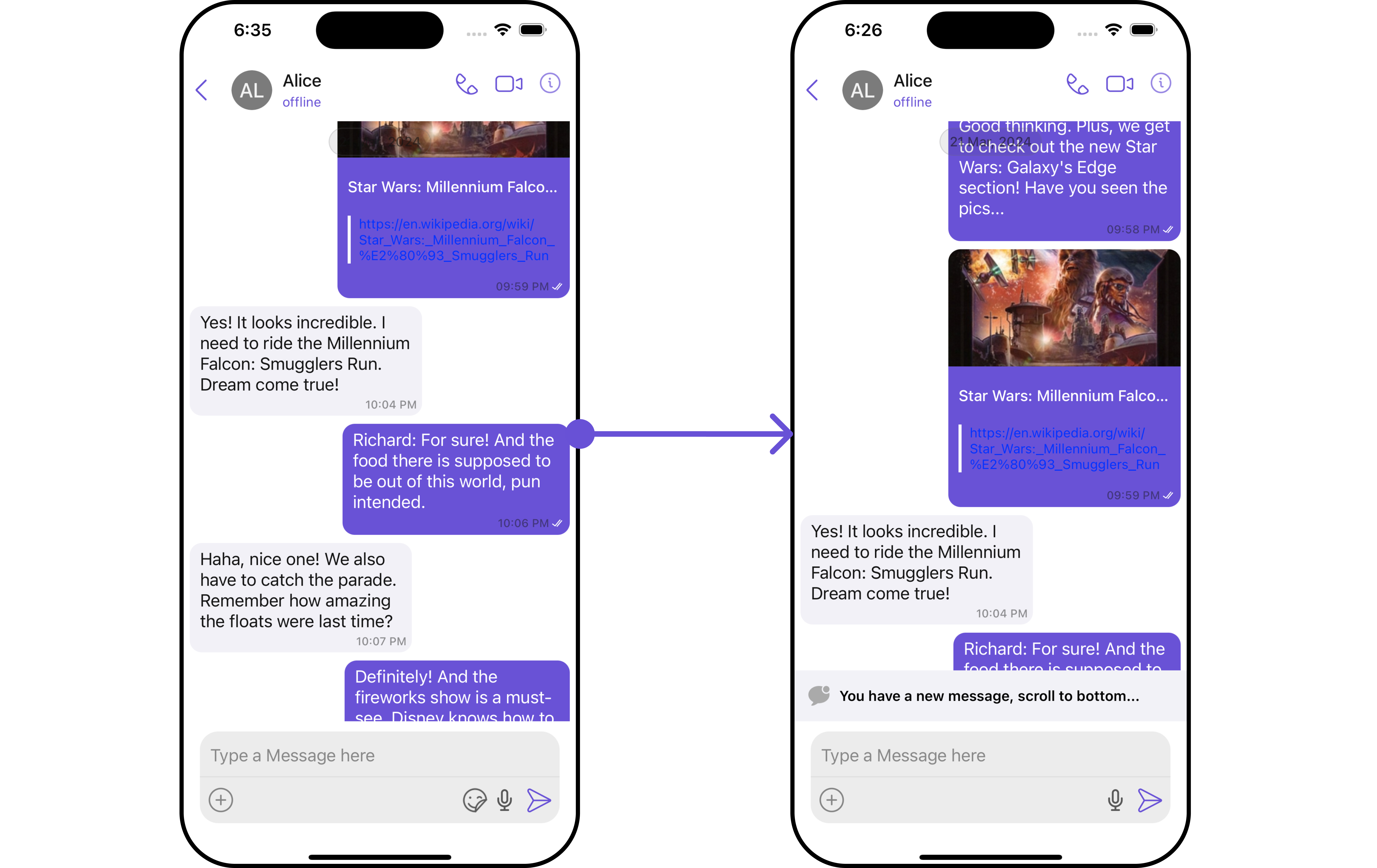
- Swift
let customFooterView = CustomChatListFooterView() // CustomChatListFooterView() is of type UIView()
let messageListConfiguration = MessageListConfiguration()
messageListConfiguration.set(footerView: customFooterView)
Following is the code of CustomChatListFooterView UIView Class
class CustomChatListFooterView: UIView {
private let pinImageView: UIImageView = {
let imageView = UIImageView()
imageView.image = UIImage(named: "new_message_icon") // set your image here
imageView.contentMode = .scaleAspectFit
imageView.translatesAutoresizingMaskIntoConstraints = false
imageView.tintColor = .lightGray
return imageView
}()
private let titleLabel: UILabel = {
let label = UILabel()
label.textColor = .black
label.font = UIFont.boldSystemFont(ofSize: 14)
label.text = "You have a new message, scroll to bottom..."
label.translatesAutoresizingMaskIntoConstraints = false
return label
}()
override init(frame: CGRect) {
super.init(frame: frame)
setupView()
}
required init?(coder aDecoder: NSCoder) {
super.init(coder: aDecoder)
setupView()
}
private func setupView() {
backgroundColor = .systemGray6
heightAnchor.constraint(equalToConstant: 50).isActive = true
addSubview(pinImageView)
addSubview(titleLabel)
NSLayoutConstraint.activate([
pinImageView.centerYAnchor.constraint(equalTo: centerYAnchor),
pinImageView.leadingAnchor.constraint(equalTo: leadingAnchor, constant: 16),
pinImageView.widthAnchor.constraint(equalToConstant: 24), // Adjust width as needed
pinImageView.heightAnchor.constraint(equalToConstant: 24), // Adjust height as needed
titleLabel.centerYAnchor.constraint(equalTo: centerYAnchor),
titleLabel.leadingAnchor.constraint(equalTo: pinImageView.trailingAnchor, constant: 8),
titleLabel.trailingAnchor.constraint(equalTo: trailingAnchor, constant: -16)
])
}
func configure(title: String) {
titleLabel.text = title // set your custom text
}
}
Set DateSeparatorPattern
You can modify the date pattern of the message list date separator to your requirement using setDateSeparatorPattern(). This method accepts a function with a return type String. Inside the function, you can create your own pattern and return it as a String.
- Swift
let messageListConfiguration = MessageListConfiguration()
.setDateSeparatorPattern { timestamp in
}
cometChatMessages.set(messageListConfiguration: messageListConfiguration)
Example
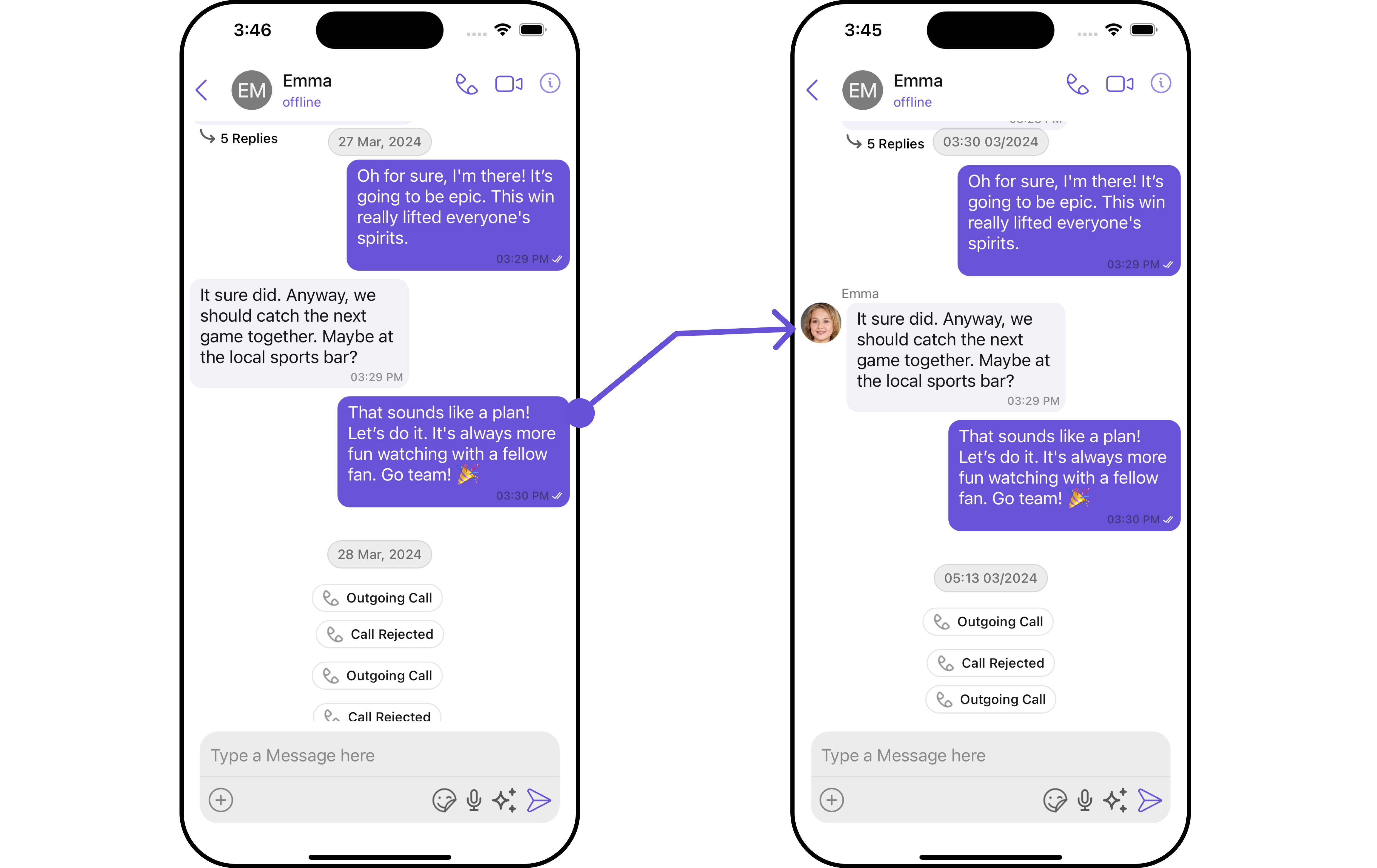
- Swift
let messageListConfiguration = MessageListConfiguration()
.setDateSeparatorPattern { timestamp in
guard let timestamp = timestamp else {
return ""
}
let date = Date(timeIntervalSince1970: TimeInterval(timestamp))
let formatter = DateFormatter()
formatter.dateFormat = "hh:mm MM/yyyy"
return formatter.string(from: date)
}
let cometChatMessages = CometChatMessages()
.set(user: user)
.set(messageListConfiguration: messageListConfiguration)
Ensure to pass and present cometChatMessages. If a navigation controller is already in use, utilize the pushViewController function instead of directly presenting the view controller.
SetDatePattern
You can modify the date pattern to your requirement using .setDatePattern. This method accepts a function with a return type String. Inside the function, you can create your own pattern and return it as a String.
- Swift
let messageListConfiguration = MessageListConfiguration()
.setDatePattern { timestamp in
}
Example
- Swift
let messageListConfiguration = MessageListConfiguration()
.setDatePattern { timestamp in
guard let timestamp = timestamp else {
return ""
}
let date = Date(timeIntervalSince1970: TimeInterval(timestamp/1000))
let formatter = DateFormatter()
formatter.dateFormat = "dd-MM-yyyy"
return formatter.string(from: date)
}
let cometChatMessages = CometChatMessages()
.set(user: user)
.set(messageListConfiguration: messageListConfiguration)
Ensure to pass and present cometChatMessages. If a navigation controller is already in use, utilize the pushViewController function instead of directly presenting the view controller.
SetErrorStateView
You can set a custom ErrorStateView using setEmptyStateView to match the error view of your app.
- Swift
let messageListConfiguration = MessageListConfiguration()
.set(errorStateView: errorView)
Example
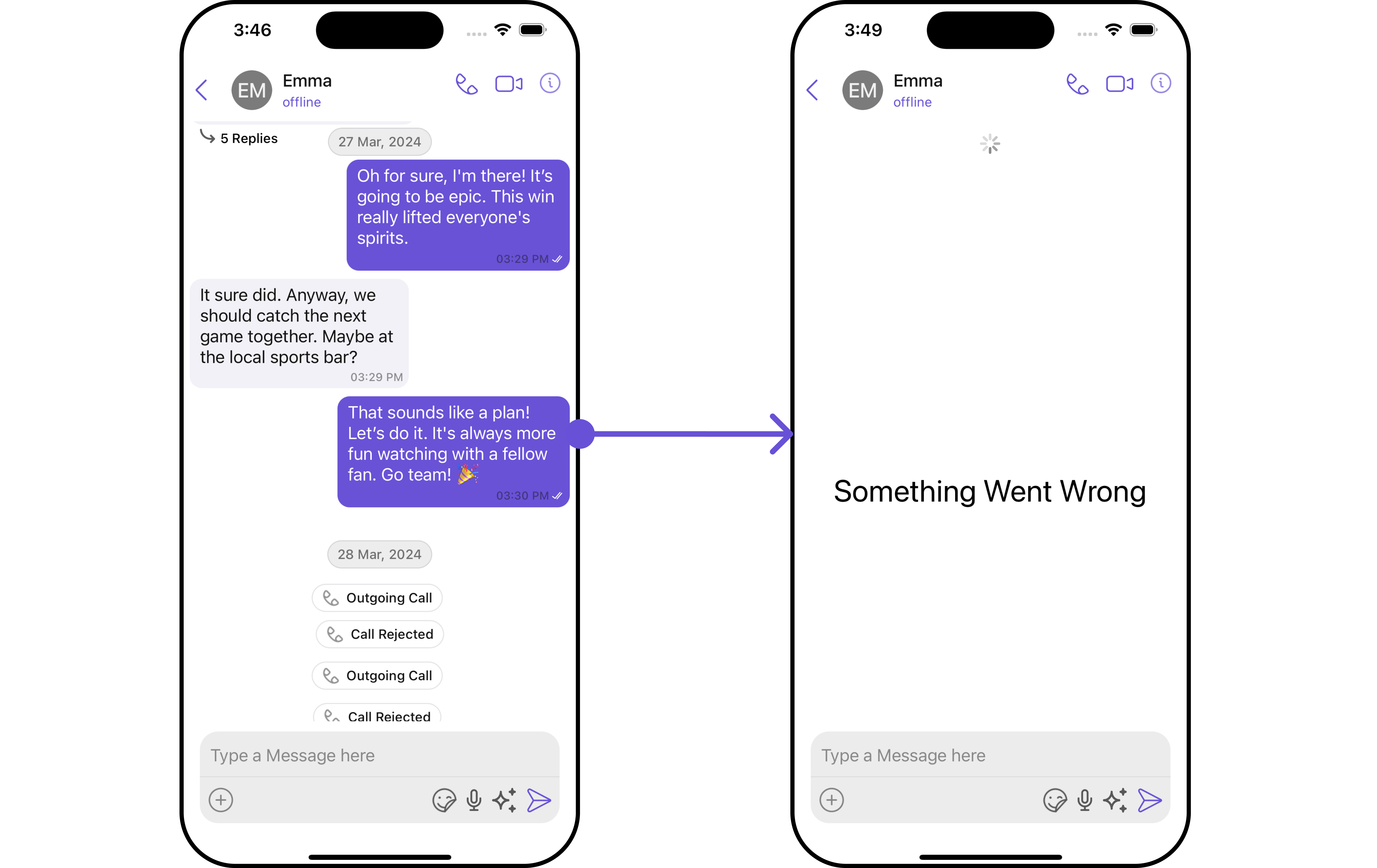
We have added an error view to error_view a UIView file. You can choose any view you prefer. This view should be passed to the .set(errorStateView: errorView) method.
import UIKit
import CometChatSDK
import CometChatUIKitSwift
class ErrorView: UIView {
override init(frame: CGRect) {
super.init(frame: frame)
setupView()
}
required init?(coder: NSCoder) {
super.init(coder: coder)
setupView()
}
private func setupView() {
backgroundColor = .systemBackground // Or any color matching your application's styles
let imageView = UIImageView()
imageView.image = UIImage(systemName: "exclamationmark.circle") // Replace with your error image
imageView.translatesAutoresizingMaskIntoConstraints = false
addSubview(imageView)
let label = UILabel()
label.text = "Something Went Wrong"
label.font = UIFont.systemFont(ofSize: 30)
label.translatesAutoresizingMaskIntoConstraints = false
addSubview(label)
NSLayoutConstraint.activate([
imageView.centerXAnchor.constraint(equalTo: centerXAnchor),
imageView.centerYAnchor.constraint(equalTo: centerYAnchor, constant: -50), // Adjust as needed
imageView.widthAnchor.constraint(equalToConstant: 100),
imageView.heightAnchor.constraint(equalToConstant: 100),
label.topAnchor.constraint(equalTo: imageView.bottomAnchor, constant: 50), // Adjust as needed
label.centerXAnchor.constraint(equalTo: imageView.centerXAnchor)
])
}
}
- Swift
let errorView = ErrorView()
let messageListConfiguration = MessageListConfiguration()
.set(errorStateView: errorView)
let cometChatMessages = CometChatMessages()
.set(user: user)
.set(messageListConfiguration: messageListConfiguration)
Ensure to pass and present cometChatMessages. If a navigation controller is already in use, utilize the pushViewController function instead of directly presenting the view controller.
SetEmptyStateView
The setEmptyStateView() function provides the ability to set a custom empty state view in your app. An empty state view is displayed when there are no messages for a particular user.
- Swift
let messageListConfiguration = MessageListConfiguration()
.set(emptyStateView: emptyview)
Example
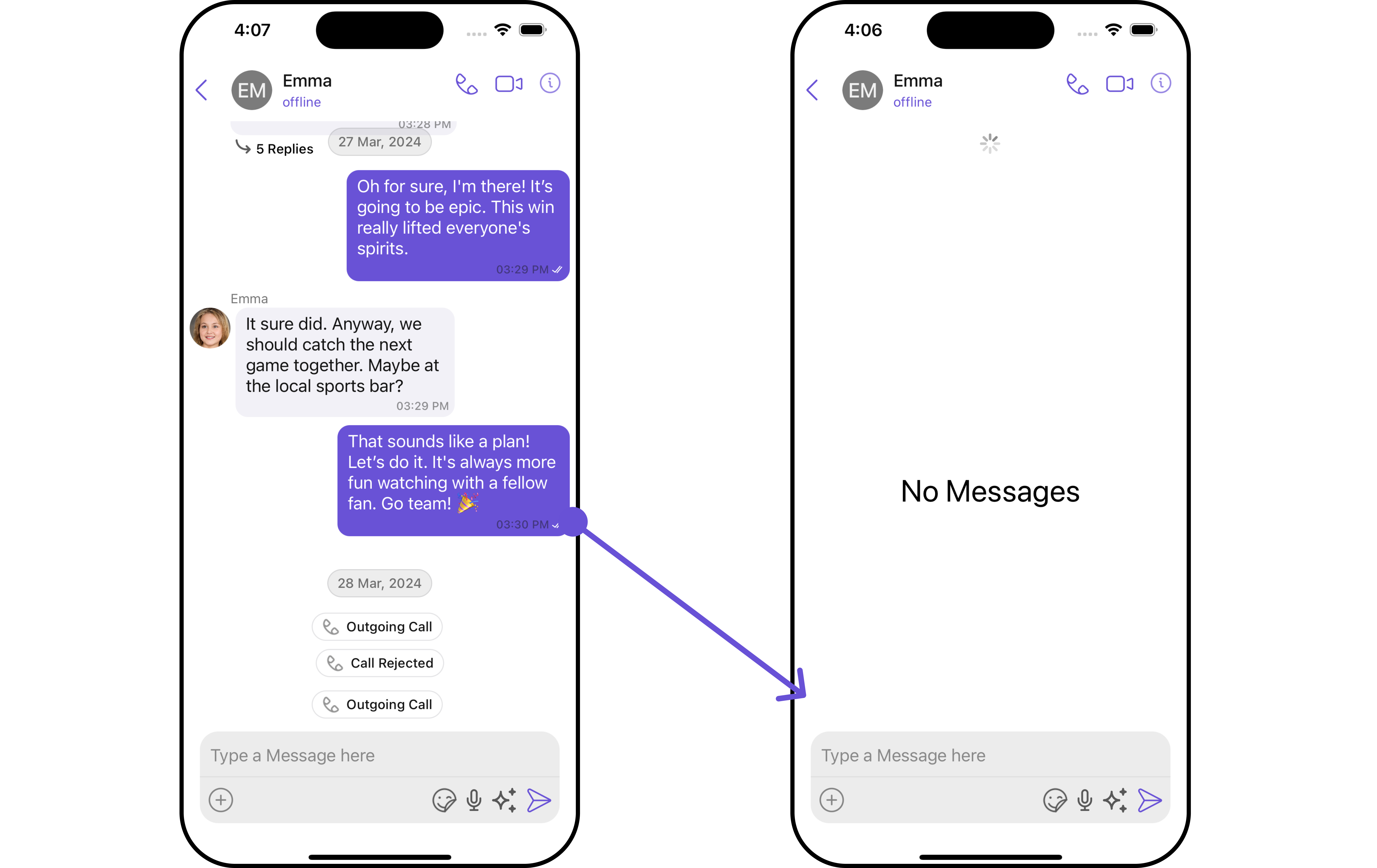
You have to create a custom layout named Empty_View, you can set it as the empty state view by passing it as a parameter to the setEmptyStateView() function.
import UIKit
class EmptyView: UIView {
override init(frame: CGRect) {
super.init(frame: frame)
setupView()
}
required init?(coder: NSCoder) {
super.init(coder: coder)
setupView()
}
private func setupView() {
backgroundColor = .systemBackground // Or any color matching your application's styles
let imageView = UIImageView()
imageView.image = UIImage(systemName: "message") // Replace with your image
imageView.translatesAutoresizingMaskIntoConstraints = false
addSubview(imageView)
let label = UILabel()
label.text = "No Messages"
label.font = UIFont.systemFont(ofSize: 30)
label.translatesAutoresizingMaskIntoConstraints = false
addSubview(label)
NSLayoutConstraint.activate([
imageView.centerXAnchor.constraint(equalTo: centerXAnchor),
imageView.centerYAnchor.constraint(equalTo: centerYAnchor, constant: -50),
imageView.widthAnchor.constraint(equalToConstant: 100),
imageView.heightAnchor.constraint(equalToConstant: 100),
label.topAnchor.constraint(equalTo: imageView.bottomAnchor, constant: 50),
label.centerXAnchor.constraint(equalTo: imageView.centerXAnchor)
])
}
}
- Swift
let emptyview = EmptyView()
let messageListConfiguration = MessageListConfiguration()
.set(emptyStateView: emptyview)
let cometChatMessages = CometChatMessages()
.set(user: user)
.set(messageListConfiguration: messageListConfiguration)
Ensure to pass and present cometChatMessages. If a navigation controller is already in use, utilize the pushViewController function instead of directly presenting the view controller.
SetTextFormatters
This functionality dynamically assigns a list of text formatters. If a custom list is provided, it uses that list. Otherwise, it gracefully falls back to the default text formatters retrieved from the data source for seamless integration.
Example
This code customizes a CometChat text formatter to identify and style the word "sure", with handling options for interactions like string search, scrolling, and item clicks. The custom formatter is then applied to CometChat messages.
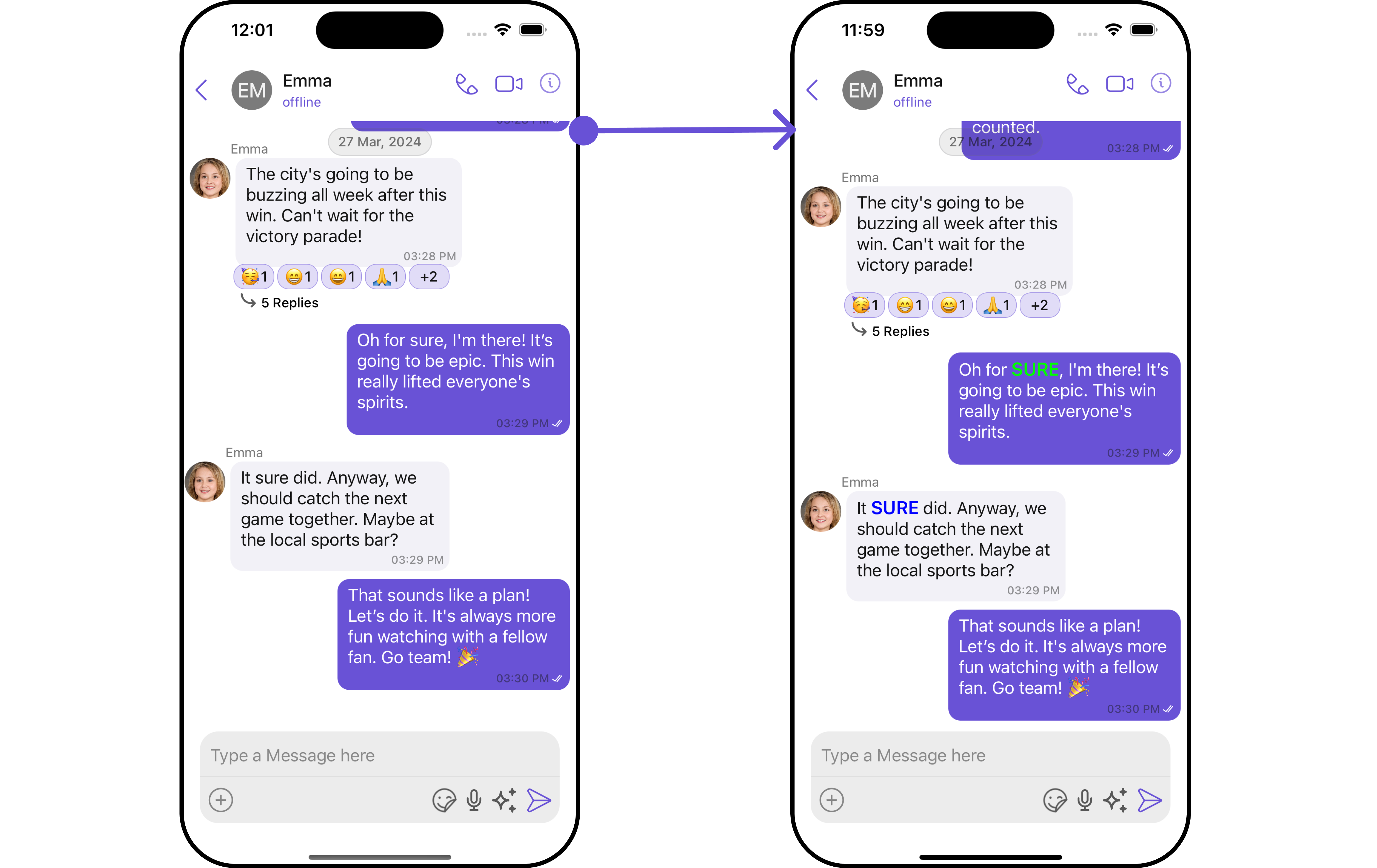
- MyCustomTextFormatter
import Foundation
import CometChatSDK
import CometChatUIKitSwift
class MyCustomTextFormatter: CometChatTextFormatter {
override func getRegex() -> String {
return "(\\bsure\\b)"
}
override func getTrackingCharacter() -> Character {
return "#"
}
override func search(string: String, suggestedItems: ((_: [SuggestionItem]) -> ())? = nil) {
// This function would call an API or perform a local search
// For now, it does nothing
}
override func onScrollToBottom(suggestionItemList: [SuggestionItem], listItem: ((_: [SuggestionItem]) -> ())?) {
// This function would call the next page of an API
// For now, it does nothing
}
override func onItemClick(suggestedItem: SuggestionItem, user: User?, group: Group?) {
// Do something with the clicked item
}
override func handlePreMessageSend(baseMessage: BaseMessage, suggestionItemList: [SuggestionItem]) {
// This function would modify the message before it's sent
// For now, it does nothing
}
override func prepareMessageString(
baseMessage: BaseMessage,
regexString: String,
alignment: MessageBubbleAlignment = .left,
formattingType: FormattingType
) -> NSAttributedString {
let attrString = NSMutableAttributedString(string: "SURE")
if alignment == .left { // Received message
attrString.addAttribute(.foregroundColor, value: UIColor.blue, range: NSRange(location: 0, length: attrString.length))
} else { // Sent message
attrString.addAttribute(.foregroundColor, value: UIColor.green, range: NSRange(location: 0, length: attrString.length))
}
attrString.addAttribute(.font, value: UIFont.boldSystemFont(ofSize: 18), range: NSRange(location: 0, length: attrString.length))
return attrString
}
override func onTextTapped(baseMessage: BaseMessage, tappedText: String, controller: UIViewController?) {
// Your Action
}
}
let myCustomTextFormatter = MyCustomTextFormatter(trackingCharacter: "#")
let messageListConfiguration = MessageListConfiguration()
.set(textFormatter: [myCustomTextFormatter])
let cometChatMessages = CometChatMessages()
.set(user: user)
.set(messageListConfiguration: messageListConfiguration)
Ensure to pass and present cometChatMessages. If a navigation controller is already in use, utilize the pushViewController function instead of directly presenting the view controller.
SetMentionsFormatters
Assigns the list of text formatters. If the provided list is not null, it sets the list. Otherwise, it assigns the default text formatters retrieved from the data source. To configure the existing Mentions look and feel check out CometChatMentionsFormatter
Example
In this example, we are customizing the CometChat's 'mentions' feature. We define different styles for mentions appearing in the message bubbles and the message composer. We also set a custom action when a mention is clicked, which shows an alert with options to view the mentioned user's profile or dismiss the alert. These customizations are then applied to the CometChat messages through the MessageListConfiguration.
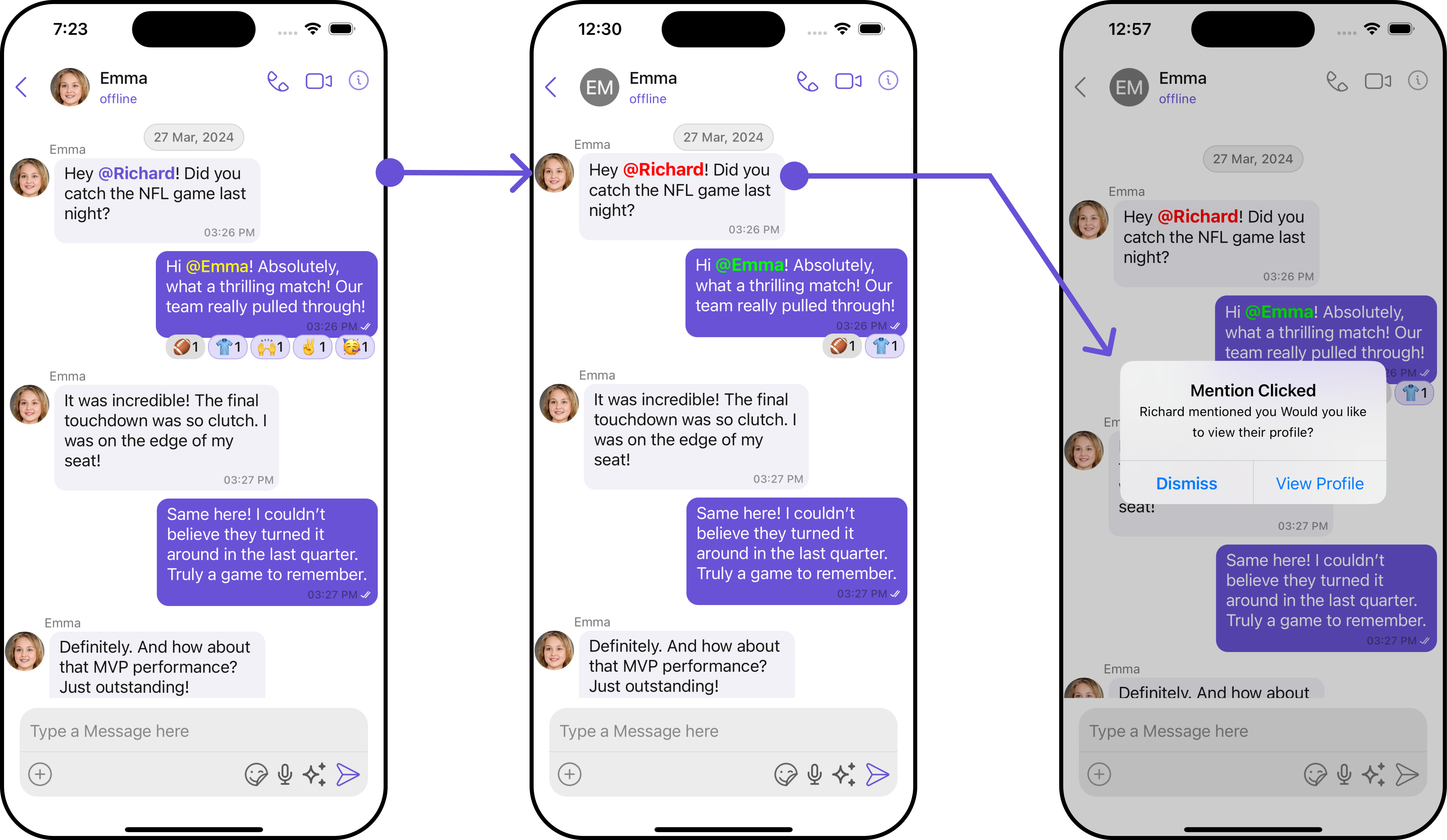
- Swift
// Initialize the MentionTextStyle for the left bubble
let leftBubbleTextStyle = MentionTextStyle()
.set(textColor: UIColor.blue)
.set(textFont: UIFont.systemFont(ofSize: 18, weight: .bold))
.set(loggedInUserTextColor: UIColor.red)
.set(loggedInUserTextFont: UIFont.systemFont(ofSize: 18, weight: .bold))
// Initialize the MentionTextStyle for the right bubble
let rightBubbleTextStyle = MentionTextStyle()
.set(textColor: UIColor.green)
.set(textFont: UIFont.systemFont(ofSize: 18, weight: .bold))
.set(loggedInUserTextColor: UIColor.red)
.set(loggedInUserTextFont: UIFont.systemFont(ofSize: 18, weight: .bold))
// Initialize the MentionTextStyle for the composer
let composerTextStyle = MentionTextStyle()
.set(textColor: UIColor.orange)
.set(textFont: UIFont.systemFont(ofSize: 18, weight: .bold))
.set(loggedInUserTextColor: UIColor.red)
.set(loggedInUserTextFont: UIFont.systemFont(ofSize: 18, weight: .bold))
// Initialize and set the CometChatMentionsFormatter properties
let customMentionFormatter = CometChatMentionsFormatter()
.set(composerTextStyle: composerTextStyle)
.set(leftBubbleTextStyle: leftBubbleTextStyle)
.set(rightBubbleTextStyle: rightBubbleTextStyle)
.set(onMentionClicked: { baseMessage, tappedText, controller in
let senderName = baseMessage.sender?.name ?? "Unknown User"
let alertTitle = "Mention Clicked"
let alertMessage = "\(senderName) mentioned you Would you like to view their profile?"
let alert = UIAlertController(title: alertTitle, message: alertMessage, preferredStyle: .alert)
alert.addAction(UIAlertAction(title: "View Profile", style: .default, handler: { _ in
// Code here to view user's profile
}))
alert.addAction(UIAlertAction(title: "Dismiss", style: .cancel, handler: nil))
controller?.present(alert, animated: true, completion: nil)
})
// Pass this customMentionFormatter to your message list's configuration
let messageListConfiguration = MessageListConfiguration()
.set(textFormatter: [customMentionFormatter])
let cometChatMessages = CometChatMessages()
.set(user: user)
.set(messageListConfiguration: messageListConfiguration)
Ensure to pass and present cometChatMessages. If a navigation controller is already in use, utilize the pushViewController function instead of directly presenting the view controller.
Configuration
Configurations offer the ability to customize the properties of each component within a Composite Component.
MessageInformation
From the MessageList, you can navigate to the MesssageInformation component as shown in the image.
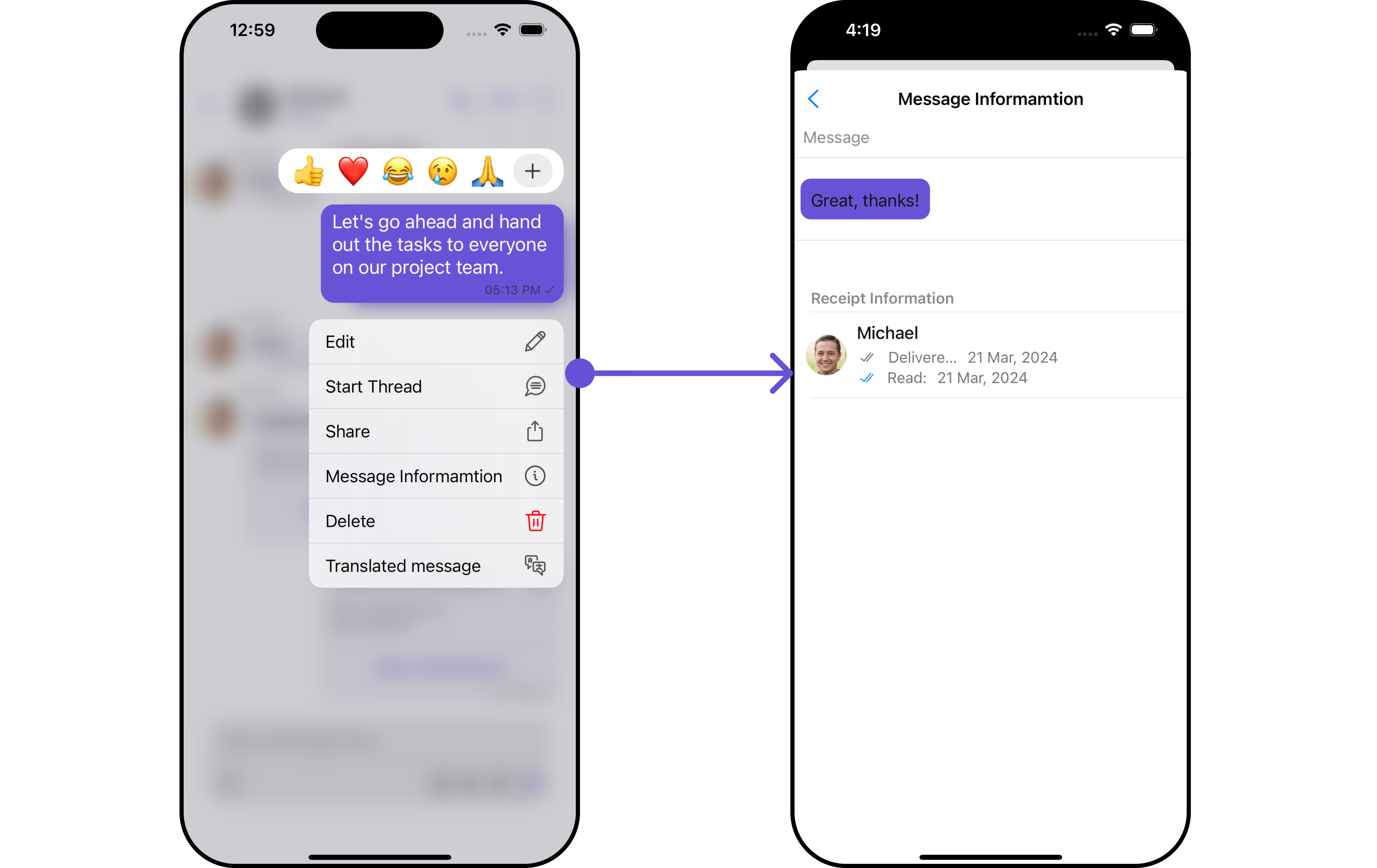
If you wish to modify the properties of the MesssageInformation Component, you can use the MessageInformationConfiguration object.
- Swift
let messageInformationConfiguration = MessageInformationConfiguration()
let messageListConfiguration = MessageListConfiguration()
.set(messageInformationConfiguration: messageInformationConfiguration)
The MessageInformationConfiguration indeed provides access to all the Action, Filters, Styles, Functionality, and Advanced properties of the MesssageInformation component.
Please note that the properties marked with the symbol are not accessible within the Configuration Object.
Example
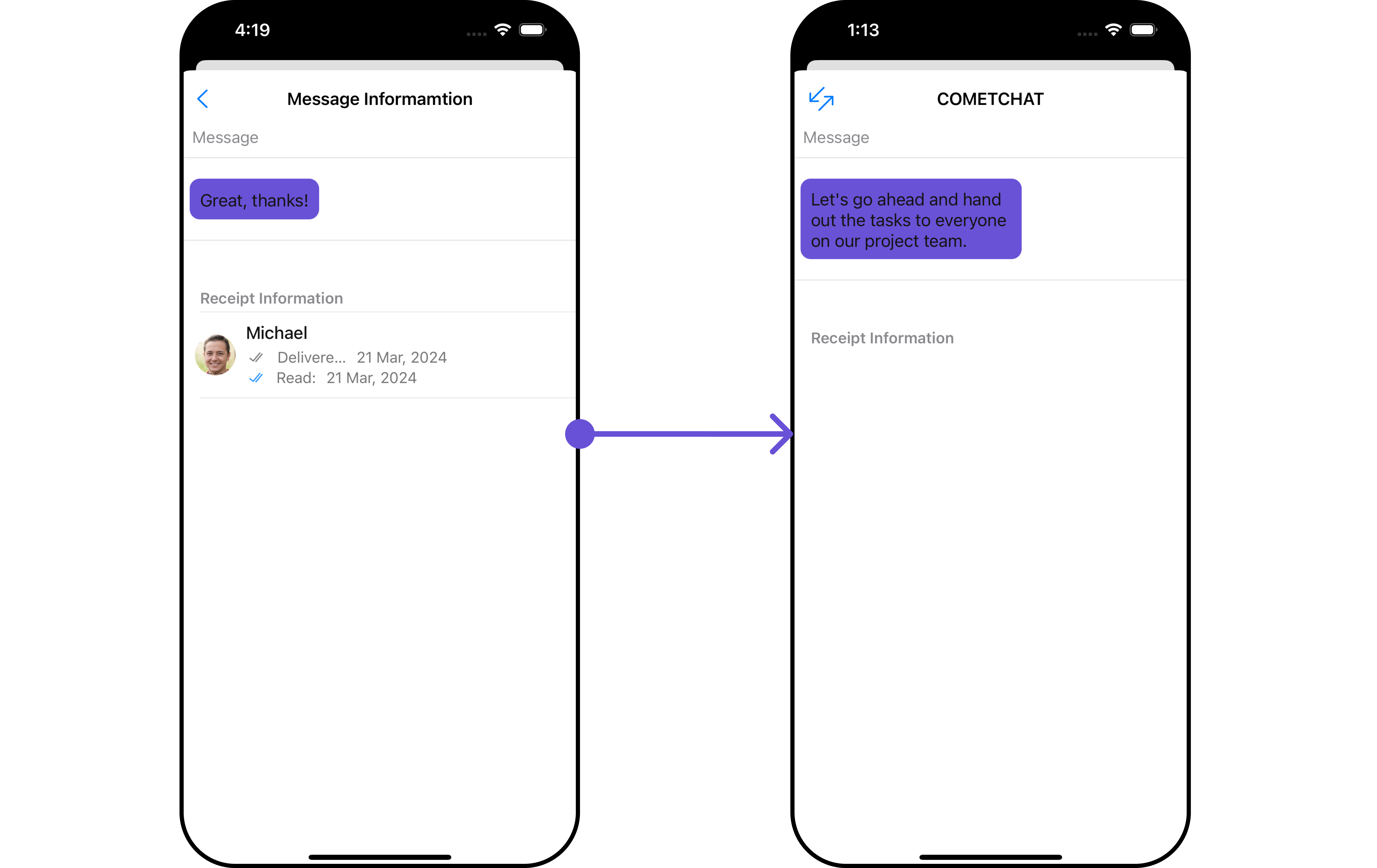
In this example, we are replacing the back button and styling a few properties of the MesssageInformation component using MessageInformationConfiguration.
let messageInformationStyle = MessageInformationStyle()
.set(background: .gray)
.set(deliveredIconTint: .green)
.set(sendIconTint: .yellow)
.set(titleTextColor: .systemBrown)
.set(borderColor: .cyan)
.set(borderWidth: 17)
.set(titleTextFont: .italicSystemFont(ofSize: 11))
.set(width: 15)
let messageInformationConfiguration = MessageInformationConfiguration()
.setStyle(messageInformationStyle: messageInformationStyle)
.set(backIcon: UIImage(systemName: "arrow.down.left.arrow.up.right")!)
.set(titleText: "COMETCHAT")
let messageListConfiguration = MessageListConfiguration()
.set(emptyStateView: emptyview)
.set(messageInformationConfiguration: messageInformationConfiguration)
let cometChatMessages = CometChatMessages()
.set(user: user)
.set(messageListConfiguration: messageListConfiguration)
In the above code, the back button is replaced, the title is set to "COMETCHAT", and the background color is set to gray. Finally, this configuration is applied to the message list.
Ensure to pass and present cometChatMessages. If a navigation controller is already in use, utilize the pushViewController function instead of directly presenting the view controller.
Reactions
If you wish to modify the properties of the Reaction Component, you can use the ReactionsConfiguration object.
- Swift
let reactionsConfiguration = ReactionsConfiguration()
let messageListConfiguration = MessageListConfiguration()
.set(reactionsConfiguration: reactionsConfiguration)
Example
In this example, we are styling a few properties of the Reaction component using ReactionsConfiguration.
let reactionsStyle = ReactionsStyle()
.set(background: .init(red: 0.81, green: 0.64, blue: 0.96, alpha: 1.00))
.set(countColor: .red)
let reactionsConfiguration = ReactionsConfiguration()
.set(style: reactionsStyle)
.set(reactionAlignment: .center)
let messageListConfiguration = MessageListConfiguration()
.set(reactionsConfiguration: reactionsConfiguration)
let cometChatMessages = CometChatMessages()
.set(user: User(uid: "emma-uid", name: "emma"))
.set(messageListConfiguration: messageListConfiguration)
Ensure to pass and present cometChatMessages. If a navigation controller is already in use, utilize the pushViewController function instead of directly presenting the view controller.